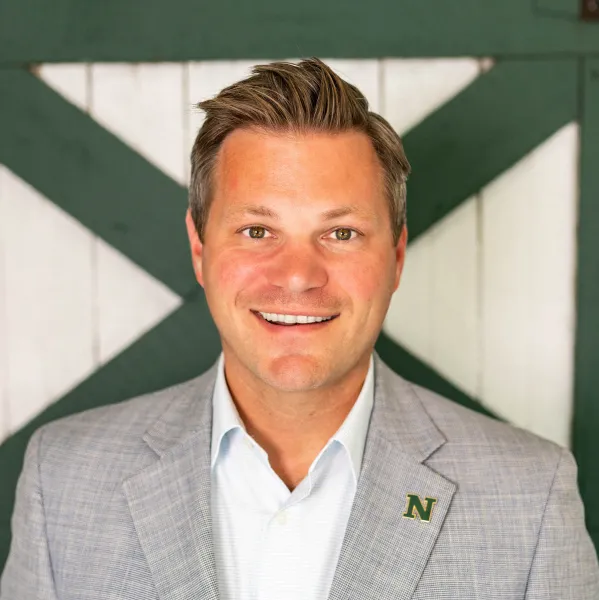David Nyberg, executive director of Business Engagement and Economic Development at Northern Michigan University, has been appointed to the higher education workgroup of Gov. Gretchen Whitmer's “Growing Michigan Together Council.” The bipartisan group seeks to increase the state's stagnant population and bolster its economy.
Michigan remains the 10th most populous state in the nation, with about 10 million residents, but it has ranked 49th out of 50 for population growth since 1990.
“I am grateful for the opportunity to contribute insights from the perspective of Northern Michigan University and the Upper Peninsula,” Nyberg said. “As a first-generation college student who left the U.P. and was fortunate to return 11 years later and begin to grow our family here, I have a personal motivation to ensure that our recommendations inspire meaningful policy change that enable opportunities for growth and prosperity of future generations.
“With some of the state's few regions experiencing an upward growth trajectory, Northern Michigan has unique experiences and valuable insight to contribute to the council as it works to develop policy recommendations designed to grow Michigan's population. It also understands the importance of smart and sustainable growth.”
The “Growing Michigan Together Council” is chaired by Republican businessman John Rakolta and Democratic education leader Shirley Stancato. Its 21 voting members are tasked with creating a plan to help attract young people to the state and keep natives from leaving, with input from four workgroups: pre-K-12 education; higher education; infrastructure; and jobs, talent and people.
According to a press release, the council will advise the governor on specific policies to increase Michigan's population and identify a population goal for 2050. It will also look at ways to prepare Michigan's workforce for in-demand jobs and emerging industries by proposing initiatives to improve preK-12 educational outcomes and long-term funding solutions for higher education, including financial aid. In order to meet the needs of a growing, thriving population, the council will also develop long-term, sustainable transportation and water infrastructure funding solutions
“Students, faculty, staff, and alumni are very familiar with the unique and magnetic Northern Experience that continues to draw inspiration and innovation to Marquette,” Nyberg said. “Our region is well-known and historically defined by its natural resources economy, which continues to fuel growth and record-setting investments in sustainable production in rural and northern Michigan communities.
"It is also becoming home to some of the state's most exciting new economy enterprises, including medical devices, cybersecurity, semiconductor components and space technology. Here at Northern, we continue to collaborate with business, community and economic development leaders to build partnerships that create opportunities for students and alumni to achieve their goals here in the U.P.”
Recruits for the workgroups hail from across the state and include former lawmakers, labor leaders, business owners, educators, nonprofit officials and at least one current college student
“These members represent a range of professions, communities, and perspectives—all of which are essential to developing a comprehensive strategy for growth,” Whitmer said in a statement. “Led by four workgroups, the council will hold several meetings over the next few months, hearing from Michiganders firsthand. They will then collaborate and continue working toward presenting a comprehensive strategy to help anyone make it in Michigan. Together, we will grow our economy and population and write the next chapter in Michigan's story. Let's get it done.”
The workgroups are expected to draft potential recommendations by September, ahead of council deliberations in October and public listening sessions in November. The council must finalize an initial report and recommendations by Dec. 1.
The new council appointees, workgroup chairs and appointees to the four workgroups were unveiled at the 2023 Mackinac Policy Conference. Learn more here.

